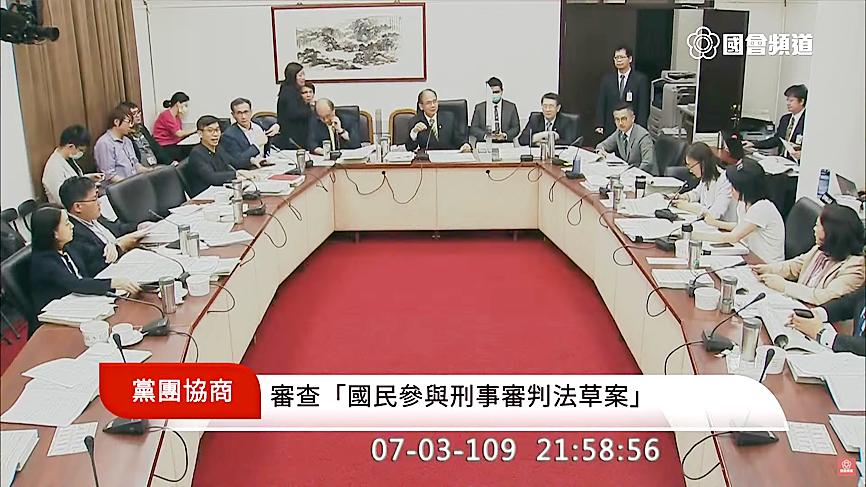Legislative Speaker You Si-kun (游錫堃) on Friday adjourned a contentious discussion among legislative caucuses over a bill for citizen participation in criminal court procedures, although the talks are to resume tomorrow.
At the time of adjournment, only 35 of 113 articles for the proposed lay judge system — which would place six lay judges alongside a panel of three official judges — were addressed, and only two were agreed upon.
Chinese Nationalist Party (KMT) caucus whip Lin Wei-chou (林為洲) and New Power Party (NPP) caucus whip Chiu Hsien-chih (邱顯智) said the bill, which would significantly affect the judicial process, should not be rushed during an extraordinary legislative session.

Screen grab from the Legislative Yuan Parliamentary TV Web site
However, the Democratic Progressive Party (DPP) caucus said that “the time for reform has come,” and urged those involved to review the proposal item by item.
The meeting was rife with disagreements on terminology and the contents of the bill, as well as on the name of the proposed act.
Although the Judicial Yuan, which proposed the bill, has called it the “citizen participation in criminal trial procedures act,” the DPP caucus proposed naming it the “national judge act,” removing words, such as “participation,” that it says might not fit the final language of the bill.
The KMT caucus said the word “judge” should not be used in the name, as it might blur the distinction between judges and lay judges.
It also said the name should replace “national” with “citizen.”
The KMT, DPP and NPP caucuses agreed that 18-year-olds should be eligible to serve as lay judges, while the Judicial Yuan said that as many people at that age are still in school, there would be a higher percentage of them who would refuse to serve.
The Judicial Yuan also said that 18-year-olds might not be able to handle the psychological pressure of being a lay judge, and instead proposed 23 as the minimum age to be considered eligible.
The Taiwan People’s Party (TPP) said that a lay judge system and a jury system should be implemented simultaneously, with the lay judge system handling criminal cases with potential prison sentences of seven or more years, and the jury system addressing matters involving corruption, insurrection or obstruction of official duty.
Judicial Yuan Secretary-General Lin Hui-huang (林輝煌) said that the TPP proposal was impractical and would require lay judges to learn two judicial systems.
Using sentences as the basis for which system would handle a case lacks a legal basis, he added.
DPP caucus Secretary-General Chung Chia-pin (鍾佳濱) yesterday said that judicial reform has been delayed since 2012, and the DPP hopes to complete it during this extraordinary session.
The proposed lay judge system should be considered a priority, as limited resources cannot sustain the introduction of a lay judges and jury trial system simultaneously, he said.
Additional reporting by Lee Hsin-fang

US President Donald Trump said "it’s up to" Chinese President Xi Jinping (習近平) what China does on Taiwan, but that he would be "very unhappy" with a change in the "status quo," the New York Times said in an interview published yesterday. Xi "considers it to be a part of China, and that’s up to him what he’s going to be doing," Trump told the newspaper on Wednesday. "But I’ve expressed to him that I would be very unhappy if he did that, and I don’t think he’ll do that," he added. "I hope he doesn’t do that." Trump made the comments in

NOT AN OPENING: Trump’s violation of international law does not affect China’s consideration in attacking Taiwan; Beijing lacks capability, not precedent, an official said Taiwanese officials see the US’ capture of the president of Venezuela as a powerful deterrent to Beijing’s aggression and a timely reminder of the US’ ability to defeat militaries equipped with Chinese-made weapons. The strikes that toppled Venezuelan President Nicolas Maduro signaled to authoritarian leaders, including Chinese President Xi Jinping (習近平), US President Donald Trump’s willingness to use military might for international affairs core to US interests, one senior official in Taipei’s security circle said. That reassured Taiwan, the person said. Taipei has also dismissed the idea that Trump’s apparent violation of international law could embolden Beijing, said the official, who was not

A cold surge advisory was today issued for 18 cities and counties across Taiwan, with temperatures of below 10°C forecast during the day and into tonight, the Central Weather Administration (CWA) said. New Taipei City, Taipei, Taoyuan and Hsinchu, Miaoli and Yilan counties are expected to experience sustained temperatures of 10°C or lower, the CWA said. Temperatures are likely to temporarily drop below 10°C in most other areas, except Taitung, Pingtung, Penghu and Lienchiang (Matsu) counties, CWA data showed. The cold weather is being caused by a strong continental cold air mass, combined with radiative cooling, a process in which heat escapes from

Snow this morning fell on Alishan for the first time in seven years, as a strong continental cold air mass sent temperatures plunging across Taiwan, the Central Weather Administration (CWA) said. The Alishan weather station, located at an elevation of about 2,200m in central Taiwan, recorded snowfall from 8:55am to 9:15am, when the temperature dropped to about 1°C, the CWA said. With increased moisture and low temperatures in the high-altitude Alishan area, the conditions were favorable for snow, CWA forecaster Tsai Yi-chi (蔡伊其) said. The last time snow fell at the Alishan weather station was on Jan. 10, 2018, while graupel fell there